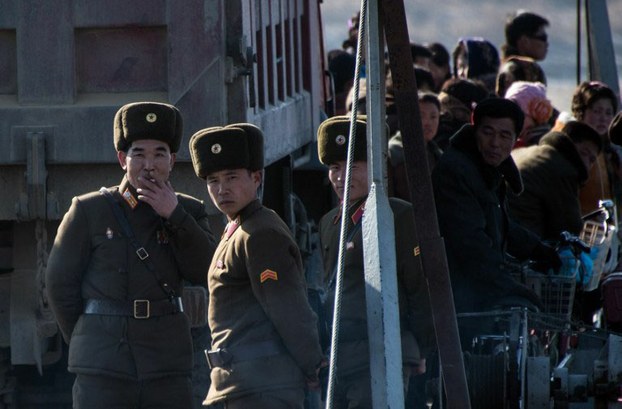North Korean border guards draw special scrutiny
| Publisher | Radio Free Asia |
| Publication Date | 16 September 2016 |
| Cite as | Radio Free Asia, North Korean border guards draw special scrutiny, 16 September 2016, available at: https://www.refworld.org/docid/5811fecf27.html [accessed 21 May 2023] |
| Disclaimer | This is not a UNHCR publication. UNHCR is not responsible for, nor does it necessarily endorse, its content. Any views expressed are solely those of the author or publisher and do not necessarily reflect those of UNHCR, the United Nations or its Member States. |
2016-09-16
 North Korean soldiers stand on a boat on the Yalu River near the border with China, Feb. 9, 2016. AFP
North Korean soldiers stand on a boat on the Yalu River near the border with China, Feb. 9, 2016. AFP
North Korean troops watching areas along the border with China are drawing increased attention from security officials in the isolated, nuclear-armed state, with guard units subjected to strict inspections and confined to barracks when not on duty, sources say.
The move appears aimed at reducing corruption and involvement in illegal activities such as smuggling and helping North Korean citizens defect into China, Japanese journalist Jiro Ishimaru told RFA's Korean Service this week.
"Beginning in August, the scrutiny of North Korean border guards appears to have intensified, with the commanders of some units inspecting the units of others," Ishimaru, the Osaka bureau chief of Asia Press, said.
"This is the first time I have heard of this happening," he said.
Speaking separately, a source living in Musan county in North Hamgyong province told RFA that border guards are now also restricted to their assigned areas, receive strict inspections, and have been subjected to "several investigations" by state security officers.
"The soldiers are having a very hard time," the source said, speaking on condition of anonymity.
Restricted movements
Guards who once moved freely around the towns near the border must now remain in barracks when not on duty, Ishimaru said.
"Previously, soldiers were able to leave their units to go to the markets or take care of personal business after going off duty. They would also have time to chat with local residents about arranging various illegal activities," Ishimaru said.
"Trying to end this now by restricting their movements shows the strong will of the Kim Jong Un regime to keep the border guards from corrupt behavior."
Meanwhile, with food shortages spreading among North Korea's border guards, soldiers are now consuming less than 300 grams of food – including corn, rice, and potatoes- – each day, sources say.
And with strengthened inspections now ending the opportunities for extra income earned by enabling smuggling or illegal crossings into China, sources say, the lives of North Korean border guards are getting harder.
Reported by Jung Min Noh for RFA's Korean Service. Translated by Jackie Yoo. Written in English by Richard Finney.
Link to original story on RFA website
